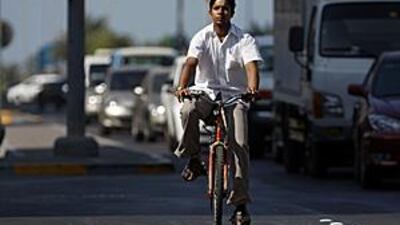When people think of bicycle-friendly cities, places such as Amsterdam and Copenhagen must come to mind. Many marvel at these cities' strong "bike culture," but it was not by accident that many people there have chosen two wheels over four. It took some cajoling and pushing by planners. In Traffic, a book by Tom Vanderbilt, he talks to a city planner in Copenhagen who said that, to reduce the number of cars entering the central city, they cut parking spaces between 1994 and 2005 from 14,000 to 11,500 and replaced them with bicycle lanes, parks and the like. Also not by accident, bicycle traffic rose at the same time by approximately 40 per cent. In Abu Dhabi the government now has a chance to do something similar.
We have a similar problem, with so many cars in the emirate and frequent traffic jams in the downtown core. The government plans to introduce a paid-parking scheme to try and price some drivers out of driving, but it could at the same time make provisions for cyclists, to encourage cycling as an alternative to the car. The other benefits to this would, of course, be reducing automobile emissions and getting more people active.
In Dubai, where it is currently illegal to ride bicycles on main roads, the Roads and Transport Authority is reportedly going to build 580 kilometres of cycling and walking tracks. It will build dedicated bike lanes in some areas, including along the service area of Sheikh Zayed Road, and provide some bike parking spaces in crowded areas. Next month, Abu Dhabi is scheduled to reveal its Surface Master Transport Plan, which will guide changes to transport in the emirate until 2030. Bicycle lanes are planned as part of those changes.
At present, few people cycle to work or anywhere else, for that matter. Cyclists say they feel they are in danger any time they put their wheels on the road. The only spots dedicated to cycling are on the Corniche and a couple rubberised tracks, but nothing resembling a network of bike lanes exists. But would bike lanes protect cyclists on the road any better? Some studies have actually shown that motorists tend to give cyclists more space as they pass them on a street without a bike lane. This means in cases where the bike lane was not protected by a kerb but only separated by a white line, motorists would actually drive closer to cyclists, a problem other studies have found can be avoided by having sufficiently wide bicycle or kerb lanes. One such study appeared in Transportation Research Record titled Evaluation of Shared-Use Facilities for Bicycles and Motor Vehicles.
Cyclists interviewed by The National's Jessica Hume for an article last November were also split on whether they would benefit from bike lanes. Martyn White, an avid cyclist, thought that motorists would not respect the lanes, while Sahar Kn said they were needed to protect cyclists. A co-worker who commutes on his bicycle to The National's offices also felt that bike lanes would improve his safety. He said motorists often whizz by his bike as he rides along in the slow lane or honk angrily if they have to slow to change into the outside lane.
It is a safe bet that cyclists here would be better off with lanes designated for cyclists than without. This would at least give cycling as a mode of transport some sort of legitimacy that cyclists do not enjoy now. It would also raise awareness among drivers that there could be cyclists on the road. But any plan that meddles with motorists is sure to meet challenges. Surely, it would take some education and enforcement, especially enforcement, to get motorists to respect the few cyclists who would brave the roads.
Officers could also get tough on cyclists who do not abide by UAE road laws. Too many cyclists ride against traffic and do not have reflectors on their bikes to give motorists a fair chance of avoiding them. Cyclists should also be fined if they are not wearing helmets, for their own safety. As cyclists begin to earn respect on the road, more people would likely take to pedalling as well. The more cyclists there are, the theory goes, the safer they are. This theory is reportedly being applied in Mexico City, where bikes account for two per cent of transport, and motorists afford cyclists little respect. Some cyclists have taken to riding in packs through the traffic because it is safer than being on their own.
As the roads became safer for cyclists and motorists and cyclists more comfortable sharing space with each other, Abu Dhabi could become a city of the bike. Some would probably opt not to ride during the hottest months, but most of the year, conditions are perfect for cycling. A change in attitude is not going to come overnight, but dedicated lanes are needed for that shift to begin. mchung@thenational.ae

